October is Breast Cancer Awareness Month and, having shared the story of one of our Directors last month (for Blood Cancer Awareness Month), we thought we would share the story of Emma, our other founding Director this month. Diagnosed with breast cancer in 2006, Emma experienced the isolation that often comes with a cancer diagnosis and is all the more acute when you’re young. Way back in 2008, Emma started meeting up with other young adults with cancer and the roots of Shine took hold. Today, Emma runs Shine with Ceinwen and is Shine’s Director of Operations and Training. Read on to learn more about Emma and why Shine does what it does!
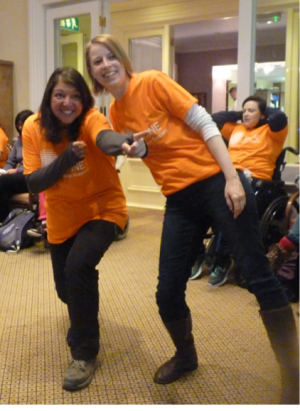
Emma (left), with Ceinwen at Shine’s 2016 Great Escape
When were you diagnosed and what with?
I was diagnosed with breast cancer in June 2006. I had two tumours and the cancer had spread to five of my lymph nodes. I also had unconfirmed spread into my breast bone and the lymph nodes in my chest so I’m still not 100% sure what stage my cancer is/was!
How did you find out you had cancer?
Early in 2006 someone drove their car into the back of mine while I was stopped at some traffic lights. I had whiplash and sprained ribs and was having physio. I found a lump in my breast that was next to one of my ribs so the GP thought it was a bleed caused by the accident but said he would refer me to the hospital anyway. When I finally got my letter from the hospital, the soonest they could see me was in 12 weeks time (this was before the two week wait was introduced in the NHS). While waiting for my physio appointment at a private hospital (I had BUPA through work), I noticed a sign for a specialist breast centre so I figured I’d get an appointment there as I had already paid my insurance excess! I was seen the following week and was sure that they were doing all of the tests to get more money from the insurance company!
I was so unconcerned about the follow up appointment that I went to receive the results on my own on the way home from work. The words from my doctor – “I’m really surprised but it is a little cancer” – will always stay in my mind. I remember thinking ”what’s a LITTLE cancer??”
What did you think and feel when you were diagnosed?
Because I had come in alone, the consultant suggested that I call my partner and come back in when he arrived. I was in shock. I can only remember certain phrases like “you’re so young that we’ll throw all of the possible treatment at you” and “normally we aim for five years survival but, with your age, we are going for 20”. I remember thinking that I would still be in my 40s after 20 years and that that wasn’t long enough.
Over the next few days, I went into planning mode to deal with work, friends, family and the huge number of hospital appointments that I suddenly had to fit in. Looking back, I coped by focusing on the practicalities such as finding pyjamas for hospital that buttoned up at the front (surprisingly difficult!).
How did the people around you react?
My partner and family were as shocked as I was. We had no family history of cancer and I hadn’t met anyone who had dealt with cancer at my age before. I really thought that it only happened to older people.
Everyone tried to help with practical arrangements but I avoided a lot of my colleagues and friends as I felt awkward dealing with their reactions. I lost count of the number of times I heard phrases like “but you’re too young for that” (I know!) and “my uncle’s brother’s wife’s sister had that – oh, she died” (thanks, that’s really helpful!).
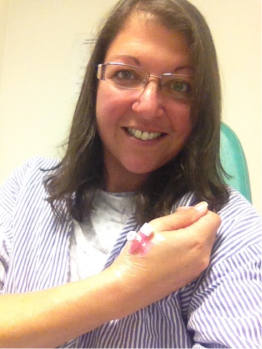
Emma during treatment
What treatment did you have?
I started with surgery to remove the original tumour but, when I went into surgery, they found another one. I had a lumpectomy rather that the mastectomy that would have been recommended if they’d known about the second tumour. I decided not to go back for the full mastectomy as my surgeon had got clear margins (it’s amazing how much jargon you learn!).
My oncologist then recommended a CT scan and a PET scan both of which showed up “dodgy bits” in my breastbone and the lymph nodes in my chest. At the time, I didn’t really understand the difference that made to my diagnosis but as the next lot of treatment would have been the same anyway, we went ahead with chemotherapy.
We also discussed the fact that I hadn’t had children and talked about options to preserve my fertility. My partner and I discussed it and decided not to take any of the options as they meant delaying chemo. I started my treatment with injections into my stomach to send me into a chemical menopause.
All together, I had 8 rounds of chemo, given every three weeks (FEC-T) and also started on infusions of Herceptin that went on for a year. I also had six weeks of daily radiotherapy to the remaining breast tissue and into my neck and I also started taking Tamoxifen tablets, (though I later switched to Exemestane). I stayed on the injections and tablets for 7 years in total. I used to say that I would rattle if I was shaken!
How did you feel through treatment?
The surgery wasn’t too bad as I was in a lovely, swanky private hospital with three course meals and a wine list! It was a bit scary having the anaesthetic though – and a bit weird coming round and finding myself halfway through a conversation that I couldn’t remember!
Going straight into menopause was also bit of a shock to the system. Overnight I developed massive hot flushes and sweats and felt like an old person when I tried to get up from the sofa.
The chemotherapy wasn’t as bad as I expected it to be but it did get worse as I went through all eight rounds. By the end of it, I had absolutely zero energy and felt like I’d been hit by a truck. My veins also decided to stop working so I agreed to have an operation to implant a portacath. This meant that the Herceptin could be given straight into a port under the skin in my chest which had a tube leading straight to my heart (sounds scary right but it definitely made life easier!).
My treatment went on for 7 years in total and I still take some tablets to deal with the after-effects of the treatment. After each type of treatment finished, I was worried about the cancer coming back as I felt like I was losing some protection they gave me. I still find the regular scans frightening though. I haven’t found a way to remove that ‘scanxiety’ completely but it is much easier with my Shine family around me.
Throughout treatment I thought that, once I was done with the main treatments, that my life would go back to normal. That never happened and when the hospital visits slowed down and treatments came to an end, I felt as if I had been abandoned to work out what came next. I felt like I was living in a ‘should be’ era – I should be feeling amazing that I’d come this far, I should be able to pick up my life from where it left off…. I am naturally a very positive person and I didn’t initially recognise that the feelings that I was having were of isolation, anxiety and depression.
It took nearly three years for me to admit that I was still struggling and to take steps to get help. It is not an understatement to say that my amazing counsellor, Kathy, changed my life completely. With her, I was finally able to sort through the mess of everything that I thought I ‘should be’ feeling and to talk through the experiences I’d had through treatment and beyond. At first I couldn’t understand how talking about it would help but it enabled me to face the anxieties I had been holding on to and to feel more empowered about my future, whatever that holds.
Tell us about your work with Shine
Throughout treatment, the “you’re too young” comments kept coming and the support groups that I attended were full of people showing me photos of their grandchildren! Eventually, I met the amazing Justine through a random breast cancer chat room. She was just a few years older than me and had also been through treatment for breast cancer. We met for coffee which ended up lasting four hours and I suddenly realised just how isolated I had been.
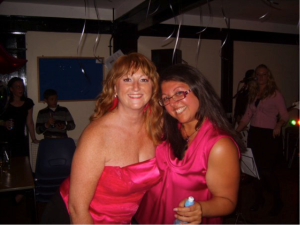
Emma and Justine at the first Shine party in 2008
That meeting led us to start Shine (although we didn’t have a name!) and we decided that we should reach out to other younger adults with all types of cancers. In the first year we connected with over 100 people in Dorset and it felt amazing to make sure that other people didn’t feel as isolated as we both had. We had fun too, doing things that suited us (mainly bars and coffees!) rather than the standard cancer support group format. And thus, Shine was born….
Meeting Ceinwen in 2010 was the next brilliant coincidence. Ceinwen had been diagnosed with cancer shortly after having a baby (you can read her story here) and was looking to do something similar to Shine in London. We met for coffee, which again lasted 4 hours (be careful if we ever have coffee together!), and we realised that we had a lot of similar ideas about the lack of support that was available to younger adults diagnosed with cancer. Together we started work on the ‘Small c’ Project, the first research project in the UK to look at the needs of young adults with cancer. We then went on to develop a programme of activities and events that aim to meet those needs.
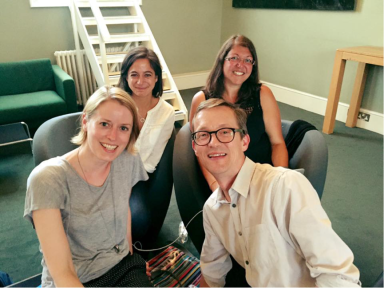
Emma and Ceinwen with Shine Trustees Laura and Christopher
We also started setting up Shine Networks in other parts of the UK, giving people the chance to meet others in similar situations much more quickly that we had been able to.
The feedback and stories we heard from the people that Shine supported in the early days quickly made my career (banking – sorry!) seem much less important and certainly less rewarding. I eventually left my career in 2012 to fully focus on Shine. I have never regretted any part of that (despite the massive impact on my bank balance!) and absolutely love my job, even on a Monday morning – and at 2am on a Sunday as it’s not really a 9-5!
Nowadays, we are both still working hard to reach the 30,000 young adults diagnosed with cancer each year in the UK and to develop more programmes to fill the gaps in support that still exist for young people dealing with cancer.
What difference has Shine made to you?
Personally, I now have a huge network of people around me that just “get it”. I can talk to people about things I wouldn’t put on my “normal” friends. I also have people that also get the dark humour and the fact that you’re definitely not being ‘negative’ by talking about your funeral music or not planning too much for the future!
I love to feel like what we do makes a difference to peoples lives, and I still sometimes can’t believe what we have achieved in just a few years (mainly because I’m always thinking about the things that we need to do in the future!). In short, Shine has definitely changed my life for the better!
How do you feel now about your experiences? What‘s been the biggest change you’ve faced?
I’ve just passed my ten-year ‘cancerversary’, but the fear of my cancer returning is still there. Certain things still trigger the trauma of some of my experiences through treatment and I don’t think that will ever go completely. However, I am much more able to deal with the scary bits now and, of course, know amazing people who help and support me.
I don’t feel grateful for having cancer. Instead, I feel grateful that I have been able to channel my experiences into something that helps other people and also brings me personal joy and fun. I try not to stress over the small stuff and I honestly appreciate much more about the wonderful people that surround me.
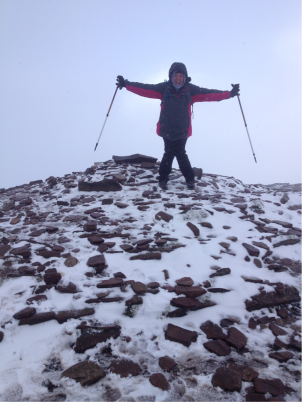
Emma in 2016!
If you could give one piece of advice to yourself before your diagnosis what would it be?
This is hard! I felt invincible before I was diagnosed with cancer and I think most people in their 20s (or 30s or 40s!) feel the same way unless they have personally experienced something really scary. I’m not sure I would have taken my own advice anyway but it would probably be to appreciate the people around you and the things in life that actually matter – and to make sure that you are living the life that you want, not the one that is expected of you.
More information about Shine’s impact and our history, staff and Trustees can be found on our website here. If you’d like to get in touch, please drop us a line at hi@shinecancersupport.org.
